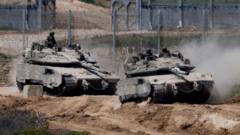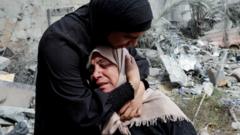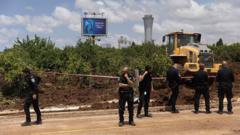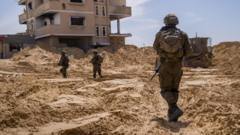Israel's recent security cabinet decision aims to capture parts of Gaza, intensifying military action with significant humanitarian implications as international leaders express disapproval.
**Israel's Security Cabinet Sanctions Military Expansion in Gaza, Prompting International Concerns**

**Israel's Security Cabinet Sanctions Military Expansion in Gaza, Prompting International Concerns**
The Israeli government has given the green light for an enhanced military offensive against Hamas, raising humanitarian and geopolitical questions.
The Israeli security cabinet convened recently, resulting in a unanimous decision to expand military operations against Hamas, targeting the capture of Gaza itself and establishing control over portions of its territory. According to Israeli officials, this decision comes alongside a mobilization of tens of thousands of reservists in the Israel Defense Forces (IDF), signaling a robust commitment to increasing pressure on the militant group.
Prime Minister Benjamin Netanyahu articulated that the operations aim to annihilate Hamas forces and rescue hostages still held captive. He indicated that the 2.1 million residents of Gaza would be relocated for their protection, though specifics regarding the extent of territory involvement were not disclosed. The plan involves utilizing private companies to facilitate aid delivery amidst a two-month blockade, a strategy criticized by the UN for contravening humanitarian norms.
Hamas swiftly rejected Israel's military tactics, characterizing them as coercive. Meanwhile, US President Donald Trump expressed his ongoing commitment to delivering food assistance to the Palestinian population. Contrasting this support, the UK formally stated its disapproval of the expansion in military operations, while the EU echoed similar sentiments, urging restraint due to concerns over civilian casualties.
During discussions on the offensive, it was reported that the military proposed a strategy that encompasses not only a military campaign but also humanitarian aid distribution, albeit under strict Israeli control. Displacement of Gazan residents has become a contentious issue, with Palestinian voices expressing resolute defiance against forced relocation; many, like 76-year-old Ahmed Shehata, have recounted prior traumatic displacements and are determined not to leave their homes again.
Compounding the crisis, local kitchens are reportedly close to exhausting their supplies due to restrictions on aid, with the UN highlighting escalating risks of hunger and malnutrition among displaced populations. Humanitarian agencies have criticized Israel's plan, claiming it exacerbates an already grim situation and places undue risk on civilians.
This military escalation follows an unprecedented cross-border attack by Hamas on October 7, 2023, which resulted in considerable loss of life, and since then, reports suggest at least 52,567 fatalities in Gaza, exacerbating the urgency for a resolution. The ongoing conflict continues to raise critical questions about military practices and the impact on civilian populations amid a complex geopolitical landscape.
Prime Minister Benjamin Netanyahu articulated that the operations aim to annihilate Hamas forces and rescue hostages still held captive. He indicated that the 2.1 million residents of Gaza would be relocated for their protection, though specifics regarding the extent of territory involvement were not disclosed. The plan involves utilizing private companies to facilitate aid delivery amidst a two-month blockade, a strategy criticized by the UN for contravening humanitarian norms.
Hamas swiftly rejected Israel's military tactics, characterizing them as coercive. Meanwhile, US President Donald Trump expressed his ongoing commitment to delivering food assistance to the Palestinian population. Contrasting this support, the UK formally stated its disapproval of the expansion in military operations, while the EU echoed similar sentiments, urging restraint due to concerns over civilian casualties.
During discussions on the offensive, it was reported that the military proposed a strategy that encompasses not only a military campaign but also humanitarian aid distribution, albeit under strict Israeli control. Displacement of Gazan residents has become a contentious issue, with Palestinian voices expressing resolute defiance against forced relocation; many, like 76-year-old Ahmed Shehata, have recounted prior traumatic displacements and are determined not to leave their homes again.
Compounding the crisis, local kitchens are reportedly close to exhausting their supplies due to restrictions on aid, with the UN highlighting escalating risks of hunger and malnutrition among displaced populations. Humanitarian agencies have criticized Israel's plan, claiming it exacerbates an already grim situation and places undue risk on civilians.
This military escalation follows an unprecedented cross-border attack by Hamas on October 7, 2023, which resulted in considerable loss of life, and since then, reports suggest at least 52,567 fatalities in Gaza, exacerbating the urgency for a resolution. The ongoing conflict continues to raise critical questions about military practices and the impact on civilian populations amid a complex geopolitical landscape.



















